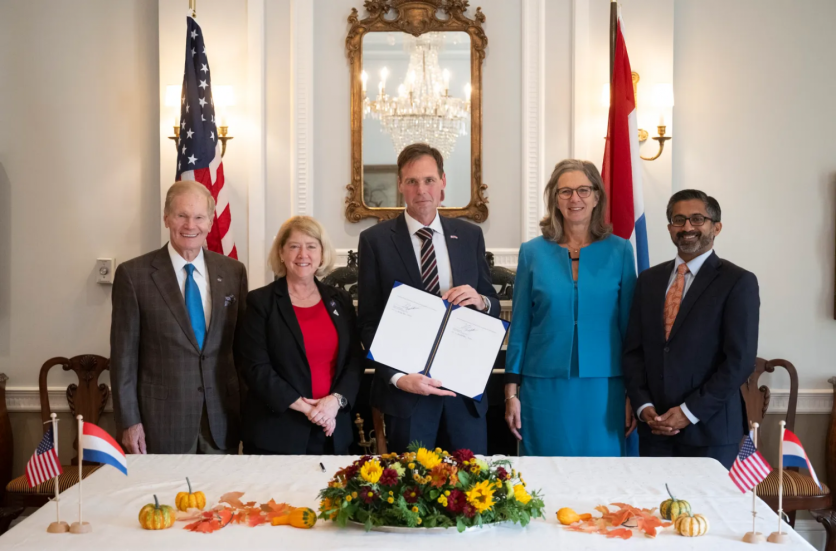The Netherlands has officially joined the NASA-led Artemis Accords, becoming the 31st member country to sign in.
NASA Administrator Bill Nelson, representing the space agency, was present during the signing held at the Dutch Ambassador's Residence in Washington on Wednesday, while Harm van de Wetering, director of the Netherlands Space Office (NSO), signed on behalf of the Netherlands.
Deputy Administrator Pam Melroy, alongside other notable figures such as Chirag Parikh, executive secretary of the US National Space Council, and Birgitta Tazelaar, the ambassador of the Netherlands to the United States, was in attendance to witness the momentous event.
"NASA welcomes the Netherlands as the newest and 31st member of the Artemis Accords family," expressed Nelson. He emphasized the need for global cooperation in ensuring the peaceful and transparent exploration of space, not only for the Artemis Generation but for future generations beyond.

NASA Welcomes The Netherlands
The Artemis Accords, serving as a practical framework, lay down essential principles to facilitate collaborative space exploration endeavors among nations, particularly those engaged in NASA's Artemis initiative.
Reflecting on the historical ties between NASA and the Netherlands in space exploration, Van de Wetering noted, "NASA and the Netherlands have been strong partners in space from the early days of spaceflight.
Pushing boundaries by technology brings new responsibilities. By signing the Artemis Accords, we underline the values we share in space, and we acknowledge we have a common responsibility."
Established in 2020 by NASA in conjunction with the US Department of State and seven other initial signatories, the Artemis Accords reaffirm and put into practice vital provisions outlined in the 1967 Outer Space Treaty.
They also amplify the commitment of the United States and the participating nations to agreements such as the Registration Convention and the Rescue and Return Agreement. Furthermore, the Accords advocate for best practices and ethical norms, including the transparent dissemination of scientific data.
With the ongoing discussions among signatories about implementing key principles of the Accords, one crucial aspect being addressed is how to prevent unintended interference on the lunar surface.
NASA's Artemis Program
NASA aims to achieve historic milestones by sending the first woman and the first person of color to the moon under the Artemis program. This endeavor is not only about breaking barriers but also about making groundbreaking scientific strides and venturing further into the lunar terrain than ever before.
While NASA takes the lead in driving the Artemis initiative, it recognizes the indispensable role of international collaborations in establishing a sustainable and resilient presence on the Moon. This collective effort is crucial as it lays the foundation for the upcoming monumental human mission to Mars.
Given the multitude of countries and private entities engaged in lunar missions and activities, the need for a shared set of principles governing the civil exploration and utilization of outer space becomes increasingly evident. This framework is essential in ensuring responsible and harmonious conduct in the exploration and use of outer space.

ⓒ 2026 TECHTIMES.com All rights reserved. Do not reproduce without permission.




